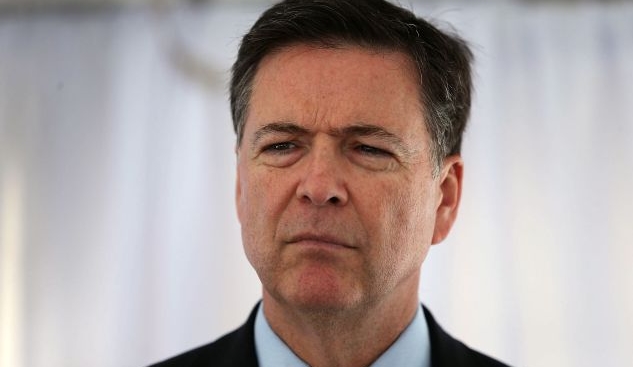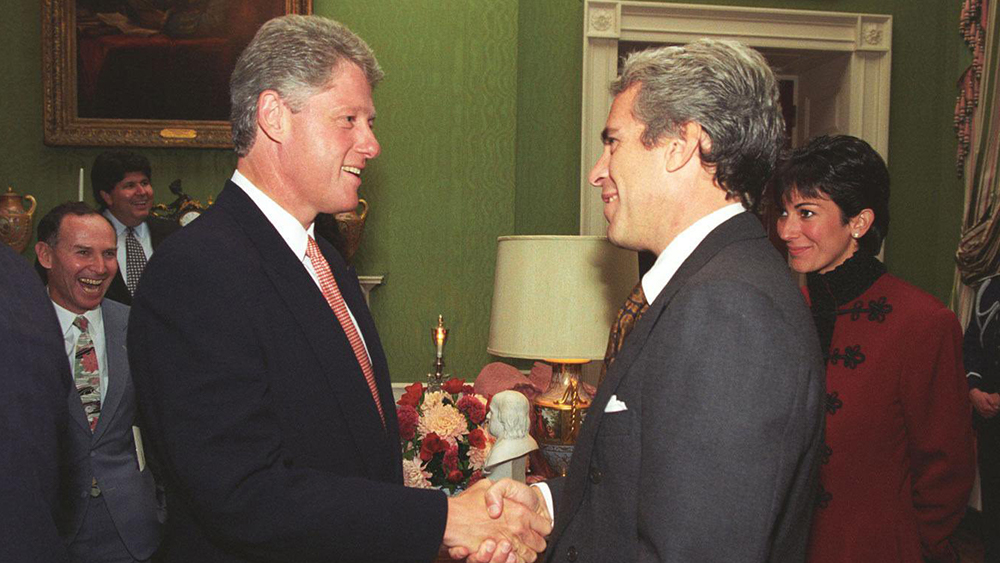 Parler
Parler Gab
Gab
- James Comey sparked controversy by posting an Instagram image of beach shells arranged as "86 47" (later deleted), which critics interpreted as a veiled threat against Donald Trump (the 47th president). The Secret Service opened an inquiry, though no charges are expected.
- The incident reignited scrutiny of Comey’s divisive legacy, including his 2016 decision not to indict Hillary Clinton, fueling accusations of FBI bias and reinforcing Trump’s "deep state" narrative.
- Comey’s daughter, a federal prosecutor, has handled sensitive cases involving R. Kelly, Jeffrey Epstein, Ghislaine Maxwell and now Sean "Diddy" Combs. Critics question potential conflicts of interest, given Epstein’s ties to powerful figures.
- Connections between Maureen’s work (e.g., clerking for a judge in Epstein-related cases) and her father’s actions have fueled speculation about coordinated efforts to suppress evidence or target political adversaries.
- The Comeys’ roles in politicized legal battles underscore broader skepticism toward law enforcement and the DOJ, with critics alleging bias and procedural overreach in high-stakes cases like Diddy’s upcoming trial.
The sea of suspicion: Comey’s ephemeral post and implications
Comey’s now-deleted post, featuring shells spelling “86 47” on Coney Island Beach in New York, followed earlier social media posts of him lounging on the sand, raising suspicions it was not a hack. Analysts noted “86” is slang for removing someone, while “47” corresponds to Trump’s place in the presidential numbering system. Though Comey provided no clarification, critics, including House Majority Whip Andy Biggs, accused him of issuing a “not-so-thinly-veiled threat.” A Secret Service spokesperson confirmed an investigation into potential threats against the president, though Comey is unlikely to face charges. The incident reflects longstanding distrust of Comey, a divisive figure known for his role in the 2016 Hillary Clinton email scandal. Pro-Trump figures argue the post underscores FBI bias against the former president, especially amid ongoing scrutiny of the agency’s handling of recent cases.Maureen Comey’s legal path: Epstein, Maxwell and the Diddy trial intersection
The controversy extends to Comey’s daughter, Maureen Comey, 32, a federal prosecutor in New York’s Southern District. Responsible for key cases including the charged but unresolved trial of R. Kelly and the comatose prosecution of Jeffrey Epstein’s associate Ghislaine Maxwell, she recently joined the team prosecuting Diddy on alleged sex trafficking and racketeering charges tied to his “Freak Off” parties. Her career has been steeped in high-profile, politically sensitive cases. As a prosecutor in the Epstein case before his 2019 death, she later led Maxwell’s Trial, which hinged on accusations of trafficking minors for Epstein. Maxwell’s links to Epstein’s “taxi network” of underage victims and royal figures like Prince Andrew amplified the case’s global significance. Critics note her concurrent involvement in the Diddy trial raises eyebrows, given the case’s exploration of alleged clandestine recordings of politicians and celebrities, echoing Epstein-era speculations about political entanglements. Maureen Comey’s background includes clerking for Judge Loretta Preska, who oversaw defamation cases involving Epstein victim Virginia Giuffre. This connection has fueled conspiracy theories about coordinated efforts to hide evidence or target figures with leverage over powerful elites.The Comey legacy: From Clinton to a systemic mistrust
James Comey’s 2016 decision not to indict Clinton for email impropriety during her presidential run remains a lightning rod for Democrats and Republicans alike. Critics argue his move undermined public trust in the FBI, seeding the “deep state” narrative that Trump amplified during his presidency. His recent behavior, including book tours and provocative social media posts, appears to feed perceptions of self-aggrandizement. The Adder reported that Comey’s novel, Donald Barr’s Space Relations, which critiques far-right influences on free speech, may tie into his beach post’s timing, appearing as a publicity stunt. This aligns with accusations that Comey seeks to revive his relevance amid fading public credibility. The juxtaposition of father and daughter’s careers highlights what detractors frame as a Department of Justice with blurred lines between legal procedure and political theater. Maureen’s role in cases like Epstein’s and Maxwell’s — which may yet reveal mid-2000s misconduct by prominent figures — has been labeled a “giant subpoena” targeting cultural icons.A fractured trust and unresolved questions
James Comey’s seashell stunt and his daughter’s legal pursuits expose enduring rifts in public confidence in law enforcement and federal institutions. Critics argue the Comeys epitomize an era where political bias and procedural overreach overshadow justice, leaving cases like Diddy’s and Epstein’s legacy trials to test the integrity of an already-disillusioned system. As the May trial begins against Diddy, and as accusations of hidden deep-state agendas resurface, the Comey saga symbolizes a broader national dilemma: Can institutions tasked with upholding the law escape the shadow of partisan suspicion? For now, the shells washed up on New York shores remain a curious metaphor for the shifting sands of American justice.A legacy entwined with scandal undermines justice, as questions on political bias persist
The Comeys’ combined history—father’s compromised reputation and daughter’s proximity to celebrity prosecutions—leaves little doubt why this family’s actions continue to inflame a polarized electorate. Whether through cryptic beach posts or high-profile trials, the Comeys’ story underscores a critical truth: when the guardians of law themselves become subjects of scrutiny, the pursuit of truth grows murkier for all. Sources for this article include: ZeroHedge.com Billboard.com BusinessInsider.com NationalReview.comTrump threatens 50% TARIFF on EU imports – but delays it after talks with Brussels
By Laura Harris // Share
Amazon unveils “Vulcan” robot with human-like touch
By Laura Harris // Share
“We had lunch in Israel once”: New questions swirl over Epstein’s intelligence links
By Willow Tohi // Share
Los Angeles Mayor Karen Bass signs executive order that seeks to revive Hollywood
By Laura Harris // Share
Israel proposes plan to screen Gaza aid recipients using facial recognition technology
By Laura Harris // Share
Home Depot braces for downturn in consumer spending after reporting slight sales increase in Q2
By Laura Harris // Share
Governments continue to obscure COVID-19 vaccine data amid rising concerns over excess deaths
By patricklewis // Share
Tech giant Microsoft backs EXTINCTION with its support of carbon capture programs
By ramontomeydw // Share
Germany to resume arms exports to Israel despite repeated ceasefire violations
By isabelle // Share










